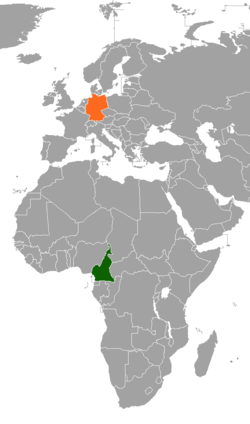Cameroon–Germany relations
 | |
Cameroon |
Germany |
|---|---|
Cameroon–Germany relations are described as "good" by the
History
The German presence in Cameroon dates back to the
The colony of Kamerun was the most economically productive of the colonies for the German Empire. For this purpose, the population was exploited and a system of plantation economy was raised. The colony supplied

An embassy of West Germany in Cameroon was established in 1960, the year of the country's independence and three years later, Heinrich Lübke visited the African state. After the end of the Hallstein Doctrine in 1973, Cameroon also established diplomatic relations with East Germany. For Cameroon, West Germany became an important donor of development aid. State visits by Cameroonian presidents Ahmadou Ahidjo and Paul Biya to West Germany took place in 1963 and 1986, respectively. In 1987, Helmut Kohl became the first German chancellor to visit Cameroon.[2]
Economic relations
Economic relations between Germany and Cameroon are still poorly developed and few German companies invest in the country due to difficult conditions in the country.[1] Bilateral trade volume in 2021 amounted to 206 million euros, with Germany importing 82 million euros worth of goods from the country and supplying 124 million euros worth of goods in return. Thus, trade with Cameroon shows little significance for German foreign trade.[4]
Development aid
For Cameroon, Germany is the most important donor country in
Joint development cooperation focuses on "decentralization and good governance," "sustainability of resource use," and "rural development." In addition, Germany is helping to build up the health care system in the country and to cope with refugee flows from neighboring countries.[1]
Culture and education
There are close cultural ties between Cameroon and Germany, and there are quite a few civil society links between associations and organizations, as well as partnerships between church congregations from both countries. The Goethe-Institut maintains a branch office in the country. German science and technology have a good reputation in the country, and nearly 2000 teachers teach the German language to nearly 200,000 students in the country, making German the second most popular foreign language in the country.[1] The German Academic Exchange Service (DAAD) and the Alexander von Humboldt Foundation support academic exchange. With nearly 7000 students (2019), Cameroonian students are the largest group of international students from Africa in Germany.[5]
Migration
There were 27,545 Cameroonians living in Germany in 2021.[6] More than a third of Cameroonians in Germany are study abroad students.[7]
Sports
The Cameroon national football team is one of the most successful national teams in Africa and has been coached several times by German managers. Among them were Peter Schnittger (1970-1973), Winfried Schäfer (2001-2004), Otto Pfister (2007-2009) and Volker Finke (2013-2015). At the 2002 World Cup, the Cameroonian team coached by Winfried Schäfer faced Germany in the group stage. Germany won 2-0 and advanced to the knockout phase.
Cameroonian footballers who have been active in
Diplomatic missions
Individual references
- ^ a b c d e Auswärtiges Amt. "Deutschland und Kamerun: bilaterale Beziehungen" (in German). Retrieved 2022-10-12.
- ^ a b "Kamerunisch-deutsche Beziehungen - pangloss.de". www.pangloss.de. Retrieved 2022-10-24.
- ISBN 978-3-638-07756-9, retrieved 2022-10-12
- ^ "Rangfolge der Handelspartner im Außenhandel" (PDF). Statistisches Bundesamt. Retrieved 2022-09-30.
- ^ a b "Deutschland und Kamerun: bilaterale Beziehungen" (PDF). Retrieved 2022-10-12.
- ^ "Ausländer aus Kamerun in Deutschland bis 2021" (in German). Retrieved 2022-10-12.
- ^ "Allgemein". Konsulat Kamerun (in German). Retrieved 2022-10-24.
- ^ Auswärtiges Amt. "Deutsche Vertretungen in Kamerun" (in German). Retrieved 2022-10-12.
- ^ Auswärtiges Amt. "Vertretungen Kameruns in Deutschland" (in German). Retrieved 2022-10-12.


